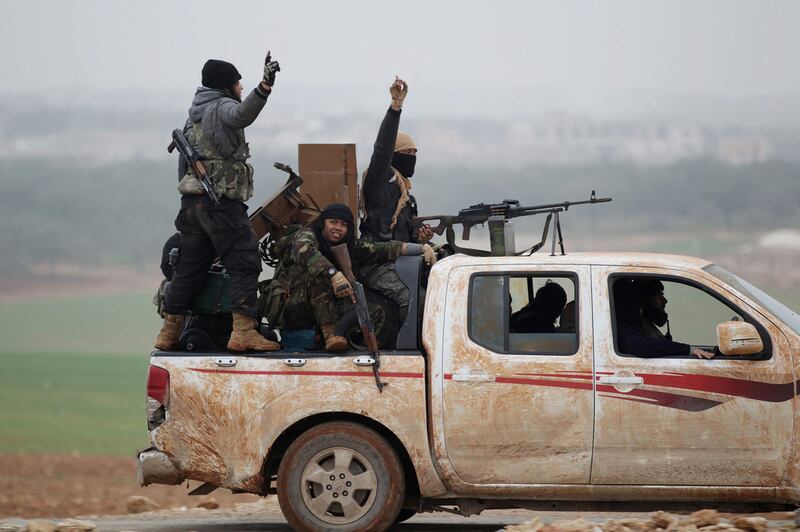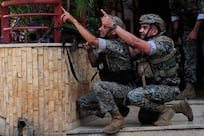The anti-ISIL coalition appears to have finally turned its attention to the Syrian front in the fight against the extremist group.
Turkey joined the air campaign over the weekend. On June 16, air strikes inside Syria forced ISIL to flee the border town of Tal Abyad, north of Raqqa – a significant defeat for the group.
Also, preparations by the rebels’ various foreign backers for the US-led training programme seem to be in their final stages: British troops are reportedly on their way to Saudi Arabia to train Syrian rebels. A plan for Turkey, Jordan, Saudi Arabia and other countries to provide trainers is nearly complete.
Much seems to be happening behind the scenes in the way the coalition thinks about ISIL. This increased attention to the Syrian front could be bad news for the extremist group, if those countries know how to harness the advantages they have.
However, if the coalition continues to be divided over basic priorities, the effort might backfire. A good example of this is Turkey’s air campaign over the weekend, which apparently focused on targeting Kurdish fighters affiliated to the PKK rather than ISIL.
A statement by Brett McGurk, the special presidential envoy for the global coalition to counter ISIL, suggested that this was not what the US and Turkey had agreed upon: “There is no connection between these air strikes against PKK and recent understandings to intensify US-Turkey cooperation against ISIL.”
That is not a good start. Different countries in the anti-ISIL camp have different priorities. For Turkey, defeating ISIL remains a lower priority than preventing Syrian Kurds from establishing the infrastructure for a future state in the north and the downfall of the Assad regime. Ankara is unlikely to change its priorities on ISIL unless there is understanding about these other issues. Also, the West is more interested in fighting ISIL than the Assad regime. But they require the help of Syrian rebels, who have the reverse priorities.
With such a divided coalition, who needs enemies? ISIL will continue to reap the benefits of such confused priorities until all the parties agree to work towards one goal under one strategy. That is possible and it starts in Aleppo.
Over the past few months, a momentum has been building among the Syrian rebels to fight ISIL: for the first time since it was established in early 2014, the usually-quiet Syrian Islamic Council issued a fatwa in June to fight ISIL. In the same month, a large coalition of rebels on the ground met in Antakya and concluded that fighting ISIL was a priority for all the rebels. Even Jabhat Al Nusra’s leader made it clear that ISIL was an enemy in an interview with Al Jazeera.
More recently, two groups believed to be close to ISIL, operating secretly in Deraa and Idlib, have increasingly engaged in hostilities against the rebels in those areas.
On Saturday, a group known as Jund Al Aqsa assassinated Mazin Qassoum, a popular rebel fighter and a founder of Faylaq Al Sham, one of the main anti-Assad groups in Idlib.
In Deraa, Liwa Shuhada Al Yarmouk released a video in which its members raised ISIL flags and slogans in a public event. These incidents increase tensions between ISIL and the rebels, after almost a year of rare clashes.
What prevents an all-out war between the rebels and ISIL, similar to the clashes in early 2014 that led to the defeat of ISIL in Idlib and much of Aleppo, is that the two sides tend to operate in different areas. Even though the rebels consider the fight against the Assad regime as a priority, they also view ISIL as a threat. They preemptively moved to uproot ISIL cells in several areas in southern Syria, and pushed back an ISIL attack in Aleppo’s northern countryside last month.
The best hope for the international coalition is that the rebels find it a logistical necessity to mobilise against ISIL, which could only happen if the rebels come face to face with the group. That scenario can be realised if the rebels control Aleppo and face ISIL in Minbij and Al Bab, two of ISIL’s key strongholds.
Unless the foreign backers of the opposition decide to enable the rebels to seriously push against the Assad regime in Aleppo, the fight against ISIL in Syria will lead nowhere.
This scenario could address the concerns of many of the differing countries in the anti-ISIL coalition, including those that fear the abrupt collapse of the Assad regime.
The takeover of Aleppo will probably change the conflict dynamics dramatically, but will not necessarily affect the regime’s fate. It can help the rebels deal a heavy blow to ISIL without seriously harming the regime.
Hassan Hassan is associate fellow at Chatham House’s Middle East and North Africa Programme, non-resident fellow at the Tahrir Institute for Middle East Policy and co-author of ISIS: Inside the Army of Terror
On Twitter: @hxhassan





